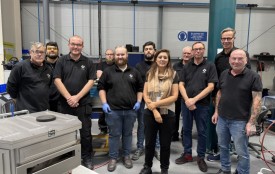World Mental Health Day originated on 10th October 1992 by Deputy Secretary General Richard Hunter; 32 years later, it remains important to continue raising awareness and acting on reducing mental health stigmas.
VACGEN has chosen to show support for this day by speaking to our HR representative, Kathy, about the steps she is taking to further educate herself on mental health, particularly in the workplace.
1) What does World Mental Health Day mean to you?
To me, every day is an opportunity to focus on mental health. However, having a designated day for mental health awareness helps bring the issue to the forefront for those who may not think about it as often as I do. This day is important to me because I work in a male-dominated field, where, statistically, men are less likely to be open about mental health or initiate conversations around it. A specific day dedicated to this can help spark important discussions that might not happen otherwise.
I also feel that, while we have made noteworthy progress in understanding mental health, there is still a gap in recognising how it manifests differently for each person. It is common for people to associate mental health with conditions like depression or anxiety, but it can present itself in a variety of ways.
2) Tell us more about the qualification and what it entails.
I am currently working towards a Level 4 Diploma in Integrative Counselling. In this programme, I focus on combining Psychodynamic Counselling, Person-Centred approaches, and Cognitive-Behavioural Therapy. The goal of my studies is to help people address how they are feeling in the present, by exploring what happened in the past that led to their current situation, and, to help them develop coping mechanisms for the future.
3) What made you decide to complete the qualification?
I have always worked in HR and with people, which is something I am enthusiastic about. However, since COVID, I have witnessed the impact it has had on both the work environment and people’s mental health. After a personal experience with someone close to me who tragically died by suicide, I felt a deep need to address the mental health crisis. It made me realise how crucial it is to educate myself to support others on their mental health journeys.
The idea of being ‘happy in your life + happy at work’ has become especially important to me through my work in HR. I have noticed that in professional settings, particularly in male-dominated environments, people often feel hesitant to talk about their mental health or the challenges they are facing. I want to help break down that stigma and offer support to those who need it.
5) What is it like to be a mental health first aider?
Being a mental health first aider has become an integral part of who I am, and I take this role seriously. I genuinely enjoy being able to help others, whether at work, at home, or even someone I pass on the street. Often, it is the absence of visible signs that can cause mental health issues to worsen. Providing clear access to support—whether through a mental health first aider, a helpline, a safe space for advice, or simply being someone to talk to without judgement—can make a real difference when someone is in need.
It is about building trust with a wide range of people, so they feel comfortable enough to talk freely.
6) How does VACGEN support mental health in the work environment?
VACGEN has invested in their employees’ mental health by providing access to a dedicated counsellor through ‘Sussex Counselling’, with approximately 10% of the company having utilised her services to date. Additionally, through Private Medical Insurance (PMI), which is available to everyone, we have access to an app called ‘We Care’ that offers virtual mental health support and includes a wellness section to help people manage day-to-day challenges.








